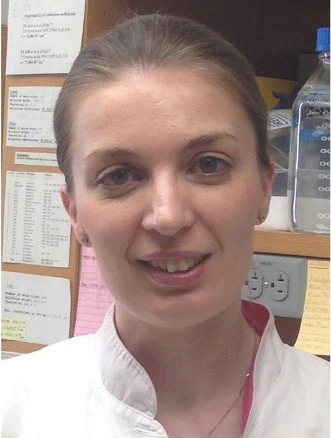
ESZTER HEGYI
University of Pécs Medical School
Institute for Translational Medicine
Address: 12 Szigeti str. H-7624 Pécs, Hungary
E: eszter.hegyi@aok.pte.hu
T: +36-72/536-246
Introduction
Chronic pancreatitis is a progressive inflammatory disease of the pancreas leading to irreversible morphological changes and impairment of both exocrine and endocrine functions. Genetics plays an important role in the pathogenesis of chronic pancreatitis, especially in children. Over the past 20 years the role of genetic factors in the etiology of chronic pancreatitis has been extensively studied and a mechanistic model in which premature trypsinogen activation plays a central pathogenic role has been established. More recently, an alternative pathomechanism unrelated to accelerated intrapancreatic trypsinogen activation has been revealed, in which mutation-induced misfolding and consequent ER stress lead to acinar cell damage and pancreatitis.
The “Center for Pancreas Disorders” within the Institute for Translational Medicine of the University of Pécs, Hungary has been established recently with an intent to build an internationally competitive, state-of-the-art, vibrant scientific laboratory dedicated to the mentored training of young scientists in the field of pancreatology and committed to finding cures for the disorders of the pancreas through basic and translational research. The Center’s research program focuses on pathological mechanisms of pancreatitis using human genetic studies, protein biochemistry, cell culture models and animal models. Human genetic studies take advantage of the Eastern and Central European Pancreatic Study Groups Biobank and Registry for Pancreatic Patients (ECEPSG RPP) initiated by the Hungarian Pancreatic Study Group and directed by Prof. Péter Hegyi who is also the chair of the Institute for Translational Medicine. The Center is also willing to invest in animal research related activities with the goal of developing genetic models of pancreatitis. Using animal models of genetically determined chronic pancreatitis we aim to study both pathomechanisms, the trypsin-dependent and the ER stress related pathways in vivo.
Laboratory techniques
In the center the students have the opportunity to master different techniques used in molecular genetics (DNA/RNA isolation, PCR, RT-PCR, Sanger sequencing, mutagenesis, Western blot), biochemistry (affinity chromatography, enzyme activity measurements), cell culture and mouse model experiments.
The students also will have the opportunity to perform some of the experiments in the laboratory of Professor Miklos Sahin-Toth (Boston University), who is a world-renowned researcher in the field of chronic pancreatitis focusing on the genetic background of the disease. Professor Sahin-Toth has a dual role in the projects; he is the director of the Center for Pancreas Disorders at the University of Pécs and he also serves as an international collaborator.
Members of the research group
Selected publications
Hegyi E, Sahin-Toth M. (2018) Trypsinogen isoforms in the ferret pancreas. Scientific Reports 10;8(1):15094.
Hegyi E, Sahin-Toth M. (2018) Human CPA1 mutation causes digestive enzyme misfolding and chronic pancreatitis in mice. Gut 2018 Jul 25. pii: gutjnl-2018-315994.
Jancso Z, Hegyi E, Sahin-Toth M. (2018) Chymotrypsin Reduces the Severity of Secretagogue-induced Pancreatitis in Mice. Gastroenterology 155(4):1017-1021.
Rosendahl J, Kirsten H, Hegyi E, Kovacs P, Weiss FU, Laumen H, Lichtner P, Ruffert C, Chen JM, Masson E, Beer S, Zimmer C, Seltsam K, Algül H, Bühler F, Bruno MJ, Bugert P, Burkhardt R, Cavestro GM, Cichoz-Lach H, Farré A, Frank J, Gambaro G, Gimpfl S, Grallert H, Griesmann H, Grützmann R, Hellerbrand C, Hegyi P, Hollenbach M, Iordache S, Jurkowska G, Keim V, Kiefer F, Krug S, Landt O, Leo MD, Lerch MM, Lévy P, Löffler M, Löhr M, Ludwig M, Macek M, Malats N, Malecka-Panas E, Malerba G, Mann K, Mayerle J, Mohr S, Te Morsche RHM, Motyka M, Mueller S, Müller T, Nöthen MM, Pedrazzoli S, Pereira SP, Peters A, Pfützer R, Real FX, Rebours V, Ridinger M, Rietschel M, Rösmann E, Saftoiu A, Schneider A, Schulz HU, Soranzo N, Soyka M, Simon P, Skipworth J, Stickel F, Strauch K, Stumvoll M, Testoni PA, Tönjes A, Werner L, Werner J, Wodarz N, Ziegler M, Masamune A, Mössner J, Férec C, Michl P, P H Drenth J, Witt H, Scholz M, Sahin-Tóth M; all members of the PanEuropean Working group on ACP. (2018) Genome-wide association study identifies inversion in the CTRB1-CTRB2 locus to modify risk for alcoholic and non-alcoholic chronic pancreatitis. Gut. 2018;67:1855-1863.
Hegyi E, Geisz A, Sahin-Toth M, Derikx MH, Nemeth BC, Balazs A, Hritz I, Izbeki F, Halasz A, Parniczky A, Takacs T, Kelemen D, Sarlos P, Hegyi P, Czako L, Hungarian Pancreatic Study Group. (2016) SPINK1 Promoter Variants in Chronic Pancreatitis. Pancreas 45:(1) pp. 148-153.